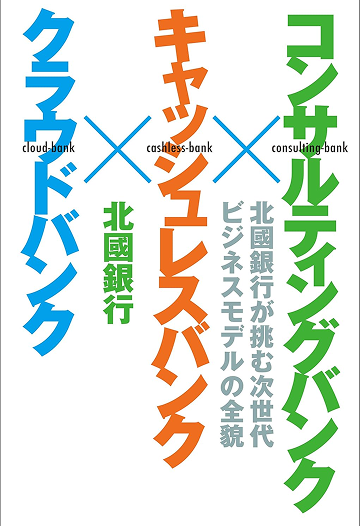Book Details
Consulting Bank × Cashless Bank × Cloud Bank
-

- This summary has been generated using AI. This book chronicles two decades of transformation at Hokkoku Bank, highlighting its evolution into a forward-looking regional leader. Centred around three strategic pillars—consulting, cashless services, and cloud banking—it showcases how the bank has pursued customer-first innovation while revitalising the regional economy.
- Published in 2021
Chapter 1: Mission and Reform of a Regional Leader
Driven by the belief that “banks must change to support the future of their communities,” Hokkoku Bank has undertaken extensive reforms over the past 20 years. Amid demographic decline, digitalisation, economic stagnation, and the COVID-19 pandemic, the bank has remained committed to customer-first management. Under the medium-term strategy “Communication × Collaboration × Innovation” (2018–2024), it has built a foundation around consulting, cashless services, and cloud technology. What stands out is the bank’s deep-rooted approach to solving regional challenges—not just offering financial services, but working alongside communities to address their needs.
Chapter 2: Becoming a Consulting Bank
In 2017, the bank established a dedicated consulting division, enabling staff to support businesses in areas such as ICT, HR, M&A, and strategic planning. For example, 13 companies in the Yamanaka lacquerware industry collaborated to develop a cloud-based production management system, improving efficiency and information sharing. In another case, the bank facilitated the merger of two local supermarkets, streamlining procurement, logistics, and advertising. It also supported the turnaround of a hot spring inn, offering guidance on finance, inventory, and HR, and leveraging a recovery fund to rebuild operations. These examples reflect a commitment to solving client challenges—not selling financial products, but enabling sustainable growth through hands-on expertise.
Chapter 3: Advancing a Cashless Society
With the aim of creating a society where people can shop confidently without cash, the bank has promoted Visa debit cards and provided free payment terminals. Touch payments have been introduced in shopping streets and inns, with user-friendly systems accessible even to older customers. The bank’s e-commerce platform “COREZO” helps circulate local products, while initiatives like point rewards, family and corporate cards enhance convenience. For businesses, the Hokkoku Visa Corporate Debit Card streamlines expense management with real-time tracking. Cashless services are positioned not merely as payment tools, but as mechanisms for reshaping the regional economic structure.
Chapter 4: Building the Cloud Bank and Driving DX
Recognising that “banking systems now run in the cloud,” Hokkoku Bank has developed its own internet banking platform using Microsoft Azure. Most transactions can now be completed via smartphone, prompting a redefinition of physical branches. In partnership with FIXER, the bank adopted agile development to respond quickly to customer needs. Despite initial clashes in development culture, mutual understanding led to a highly rated, user-friendly service. Cloud migration has also reduced system costs and strengthened security. The bank plans to expand cloud banking to corporate clients, supporting operational efficiency across the region.
Chapter 5: From Local to Global—Supporting Overseas Expansion
To help local businesses expand internationally, the bank opened a Singapore branch in 2016. This initiative goes beyond establishing a presence—it includes hosting trade fairs, matching with buyers, and offering guidance on export regulations and pricing. For example, “experiential exhibitions” for traditional crafts have led to nine confirmed deals and twelve promising negotiations. Local staff provide ongoing support, bridging language and distance. Even during the pandemic, the bank explored online meetings and digital exhibitions, offering flexible solutions. These efforts position the bank not just as a financial institution, but as a “regional trading company.”
Chapter 6: Envisioning a Regional Integrated Company
Hokkoku Bank is redefining itself as a next-generation regional integrated company. In addition to core banking services—deposits, lending, and payments—it offers corporate consulting, personal asset management (IFA), card and leasing services, system development, e-commerce, recruitment, BPO, debt collection, equity funds, and investment functions. For example, its “all-staff consulting model” enables branch staff to provide expert support. The “Hokkoku Omakase Navi” service helps individuals with asset formation. The bank also develops its own ATMs and cloud banking systems, strengthening its tech capabilities. Initiatives like “COREZO” and the “Hokkoku DX Cashless Fund” directly contribute to regional revitalisation. By prioritising the quality of earnings and embracing change, the bank is shaping a new model of financial service.
Chapter 7: Developing Talent and Transforming Culture
Transformation at Hokkoku Bank extends beyond systems and services—it’s about people. Through IT projects, staff have shifted their mindset, embracing agile methods, partnerships with startups, and cloud technologies. A culture of “taking action first” and learning from failure has taken root. Executives have deepened their understanding of IT, enabling faster decision-making. Internally, tools like Slack and Teams support paperless workflows, remote work, and flexible schedules. Training programmes with external partners and hands-on learning help employees grow into professionals who contribute to the region’s future.
Chapter 8: Supporting Businesses Across Their Lifecycle
The Hokkoku Financial Group provides support across all stages of a company’s lifecycle—from startup to growth, restructuring, and closure. It offers assistance with business planning, subsidies, financing, ICT adoption, and recruitment. During growth, it supports funding, operational improvement, and M&A. In restructuring, it helps with debt resolution, DDS (debt-to-equity swaps), and asset sales. Group companies include Hokkoku Servicer (debt collection), Hokkoku Management (restructuring), and the Hokkoku DX Cashless Fund (investment). Through equity funds, the group becomes a shareholder and strategic partner, not just a lender. These efforts reflect a mission to solve regional challenges and improve productivity, with a group-wide system to support local businesses.
